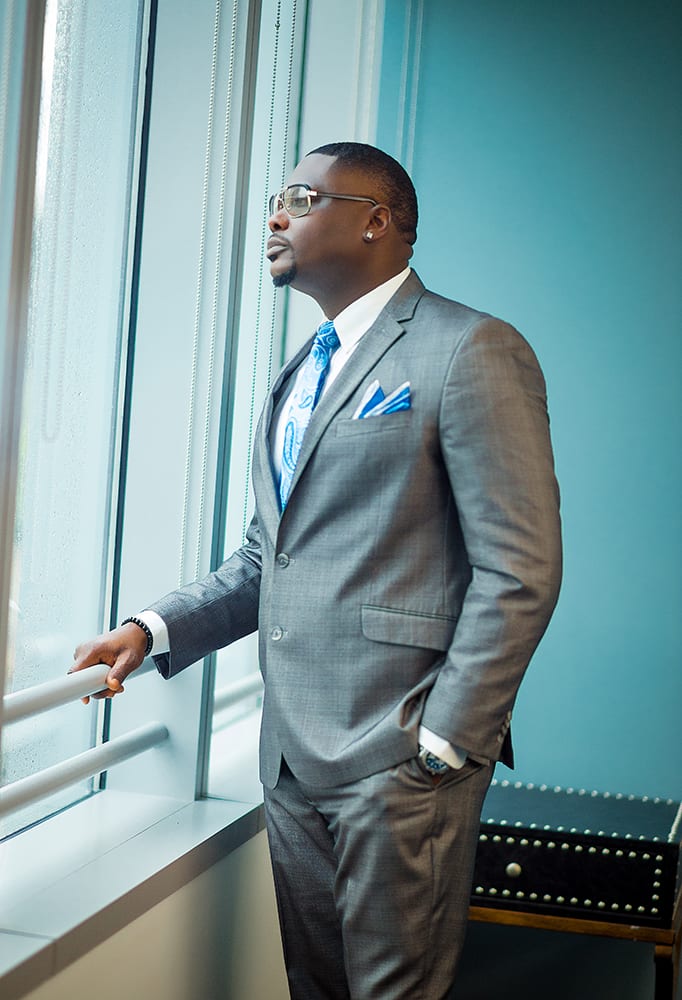By Sarah Brutus + Photo by Smitty
Q: Where were you born?
I was born in Nassau, Bahamas. That’s where I started grade school. I came to the United States in the late ’80s.
Q: Where did you go to school in South Florida?
I went North Miami Senior High, and in my first year I began to get into some trouble. Haitians weren’t really respected at that time in Miami, so it was a constant fight whenever you identified yourself as Haitian. That’s when my parents decided to send me to Haiti, and that’s where I finished high school.
Q: What was it like moving to Haiti as a teenager and going for the first time?
Everything that I took for granted here in the U.S., as hard and as hostile of an environment it was in Miami, was still better than quality of living experienced by many people in Haiti. Things in the States – such as free lunches or being able to jump on the school bus, electricity, all of that stuff – I took for granted.
Q: What was the experience like in Haiti?
While living in Haiti, I experienced a lot of things, including political unrest. I was in Haiti when the Embargo was imposed, and for the first time I experienced poverty. If I had money, it often came down to whether I would eat that day and walk to school, or if I would walk that day so I could eat. Haiti was a truly humbling experience.
Q: When did you return to the United States?
Well, from Haiti I went back to Nassau, Bahamas. I started to attend college there at a small Christian school called Galilee College. I came back to the U.S. in about 1998. I was about 19 years old.
Q: What was it like coming back to the United States?
When coming back to the U.S., I had a lot of fears, including the fear that everyone in my age group would be much more advanced than me. So it propelled me be focused and to work hard to get to where I needed to be.
Q: How did you get into starting your business?
Starting my own business was really a result of me not being able to work. I came on a visa, and I didn’t have documents to work. So I had to become a hustler per se and figure out ways to make money. I started school at FIU, but I couldn’t finish school because I was an international student and the cost of attendance for a non-resident was about three times the cost of regular admission.
Q: What was your first job in the U.S.?
I started working for this clinic doing marketing and promotions for them. The owner at the time took a liking to my skills, and eventually I was able to gain ownership in one of the clinics, which then led to ownership in multiple clinics. That’s when things started to happen for me.
By the age of 26, I owned about ten properties.

Q: What did you do next after you started gaining ownership in the clinics?
I started to invest it into properties. By the age of 26, I owned about ten properties. Everything was good until 2008, when the housing crash happened. We lost millions of dollars. After that I went into doing taxes, which also grew exponentially. This opened doors to other opportunities. I started my software company, which makes accounting software that is doing very well and being sold and used across the country. Lastly, while doing taxes, I discovered the need for credit empowerment with my clients. So I began studying credit and its dynamics. I traveled across the country to workshops and meetings with different bankers to truly understand the credit system in the U.S.
Q: What is South Beach Funding?
I got into it because a lot of people around me needed help to borrow money for businesses. So, now knowing how to get credit, I was tailoring credit for these loans that allowed them to get their businesses off the ground. This has allowed these people to make a difference in the community.
Q: Did you know your businesses would do so well?
God has blessed me where my companies are bringing in about one million dollars a year. I have over 15 employees, some of whom have been working with me for over eight years. We have an office in Louisiana that’s also fully staffed and doing well.
Q: What has been the hardest part of running your business over the past couple of years?
The hardest part, and something that I deal with every day, is how every decision I make or move that I make can affect the company and the people that have bought into my vision and rely on my companies for their livelihood. The second hardest part I have found is how uninformed our community is. I’m not just speaking about Haitians, but the black community as a whole, and even the white community when it comes to finances. I ask myself, if this system exists, why is it not publicly provided or a required course in school?
Q: What has been your biggest accomplishment in business?
I think my biggest accomplishment is the people who I have been able to influence and see become successful in their own right. That is amazing to me, and makes me very proud.
One last thing that I would say to anyone is to believe in yourself.
Q: Any final advice? Surround yourself with good people. That’s key. Don’t be the smartest person in the room all the time. If you are, then you need a new circle. Saturate yourself with positive energy, and don’t be afraid to walk away from people who don’t share your vision.



